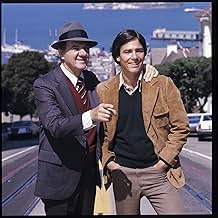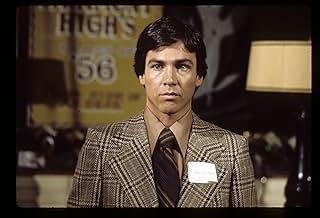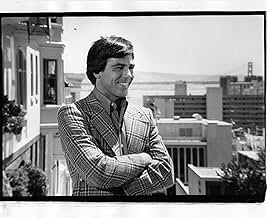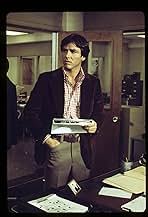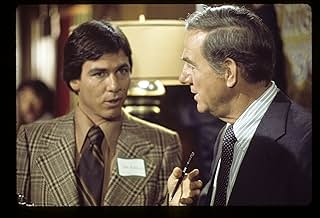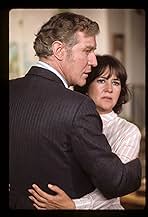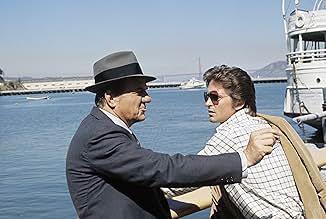A veteran cop with more than twenty years of experience is teamed with a young Inspector to solve crimes in San Francisco, California.A veteran cop with more than twenty years of experience is teamed with a young Inspector to solve crimes in San Francisco, California.A veteran cop with more than twenty years of experience is teamed with a young Inspector to solve crimes in San Francisco, California.
- Nominated for 16 Primetime Emmys
- 4 wins & 24 nominations total
Browse episodes
Featured reviews
It was not only that Karl Malden and Michael Douglas had good chemistry for four out of five seasons, they did. But it was a friendly generational rivalry in looks and style.
Back in the 40s and 50s on the big screen and small detectives all looked like Karl Malden with the button down shirts and the obligatory fedora. But in 1972 when The Streets Of San Francisco made its debut Malden was dinosaur from another era. So without one big of dialog set you had a generation gap the second Michael Douglas in a hip outfit for the Seventies or as hip as a police force allows you to be.
But there was no conflict, an occasional disagreement as the older cop taught the younger one. But it wasn't that Malden was always right. Occasionally Douglas taught Malden a thing or two about reaching the younger generation when it was necessary to solve a case.
Douglas left the show in 1976 and Richard Hatch became Malden's new partner. But they never quite got it together as a team the way Malden did with Douglas.
I liked the show, I liked the stories. But most of all Malden and Douglas were a joy to watch.
Back in the 40s and 50s on the big screen and small detectives all looked like Karl Malden with the button down shirts and the obligatory fedora. But in 1972 when The Streets Of San Francisco made its debut Malden was dinosaur from another era. So without one big of dialog set you had a generation gap the second Michael Douglas in a hip outfit for the Seventies or as hip as a police force allows you to be.
But there was no conflict, an occasional disagreement as the older cop taught the younger one. But it wasn't that Malden was always right. Occasionally Douglas taught Malden a thing or two about reaching the younger generation when it was necessary to solve a case.
Douglas left the show in 1976 and Richard Hatch became Malden's new partner. But they never quite got it together as a team the way Malden did with Douglas.
I liked the show, I liked the stories. But most of all Malden and Douglas were a joy to watch.
The 119 hour-long episodes of this police drama were originally broadcast on ABC from 1972 to 1977. This DVD contains 12 episodes (570 minutes) of the 23 episodes from the second season. All the second season episode titles and their original air-dates are detailed below.
Quinn Martin ("The Fugitive" and "The F.B.I.") stayed with his favorite genre and enhanced it by using the city made famous for its crime by "Bullet" and "Dirty Harry". The production is classy but the stories are not particularly interesting or original.
The show's real claim to fame is as the best ever pairing of a veteran cop with a young hunk rookie. While this is an overused concept it works particularly well in this series because the actors (Karl Malden as Mike Stone and Michael Douglas as Steve Keller) shared much the same career dynamic as their on-screen characters. Veteran actor Malden ("On the Waterfront" etc.) plays a blue-collar 23-year veteran of the force and acting novice Douglas a college-educated newcomer interested in new methods of crime solving.
Then again, what do I know? I'm only a child.
Quinn Martin ("The Fugitive" and "The F.B.I.") stayed with his favorite genre and enhanced it by using the city made famous for its crime by "Bullet" and "Dirty Harry". The production is classy but the stories are not particularly interesting or original.
The show's real claim to fame is as the best ever pairing of a veteran cop with a young hunk rookie. While this is an overused concept it works particularly well in this series because the actors (Karl Malden as Mike Stone and Michael Douglas as Steve Keller) shared much the same career dynamic as their on-screen characters. Veteran actor Malden ("On the Waterfront" etc.) plays a blue-collar 23-year veteran of the force and acting novice Douglas a college-educated newcomer interested in new methods of crime solving.
Then again, what do I know? I'm only a child.
The Streets of San Francisco, as with most Quinn Martin series, is a standard crime drama. What makes the show better than most crime dramas is the father/son chemistry between Karl Malden as veteran Detective Lt. Mike Stone and Michael Douglas as the younger partner Inspector Steve Keller, the 70's, R&B-style theme music by Patrick Williams and the cool, pre-MTV opening credits.
What really made this show better than most is the fact that Quinn Martin did spend the extra money and filmed the show entirely in San Francisco. In the 70s, most prime time TV shows were filmed in Los Angeles. I believe Hawaii Five-O was one of only a few prime-time dramas from the early 70s that was filmed on location.
When Douglas left the series and Richard Hatch (from the original Battlestar Galactica, not the Richard Hatch from the first Survivor) replaced him, I quickly lost interest in the show. The chemistry between Malden and Douglas was very important to the show and Hatch had the thankless task of creating a character that in the long run was bland.
Despite the show's final season, I'm certain that if I had the TV on and heard the drum beats of The Streets of San Francisco theme, I am very sure that I will probably spend the rest of the hour watching the show.
What really made this show better than most is the fact that Quinn Martin did spend the extra money and filmed the show entirely in San Francisco. In the 70s, most prime time TV shows were filmed in Los Angeles. I believe Hawaii Five-O was one of only a few prime-time dramas from the early 70s that was filmed on location.
When Douglas left the series and Richard Hatch (from the original Battlestar Galactica, not the Richard Hatch from the first Survivor) replaced him, I quickly lost interest in the show. The chemistry between Malden and Douglas was very important to the show and Hatch had the thankless task of creating a character that in the long run was bland.
Despite the show's final season, I'm certain that if I had the TV on and heard the drum beats of The Streets of San Francisco theme, I am very sure that I will probably spend the rest of the hour watching the show.
San Francisco was still like THIS! Karl Malden dispensing wisdom, Michael Douglas dispensing testosterone, new Fords as far as the eye can see, and only a hint of the depravity that the city exudes. Good stories, well directed, thoughtful in short doses. Worth your time until Douglas exits, then it fades to black.
Just the opposite of Dirty Harry. Where Eastwood spent his time ranting against and beating up, shooting, or threatening hippies, women, and Blacks, these were San Francisco detectives in a show with a social conscience even while they tried to catch criminals.
Gays are depicted positively. Blacks shown sympathetically, even if guilty of crimes. Outcasts of all kinds are shown as victims of circumstances.
Probably the height of its progressive sensitivity was an episode with one of Arnold Schwarzenegger's first roles. He plays a bodybuilder who accidentally kills a woman who mocked his muscle flexing. Surprisingly, his acting was better than in most of his films.
Gays are depicted positively. Blacks shown sympathetically, even if guilty of crimes. Outcasts of all kinds are shown as victims of circumstances.
Probably the height of its progressive sensitivity was an episode with one of Arnold Schwarzenegger's first roles. He plays a bodybuilder who accidentally kills a woman who mocked his muscle flexing. Surprisingly, his acting was better than in most of his films.
Did you know
- TriviaBy all accounts Karl Malden and Michael Douglas developed a strong professional and personal relationship from their time on the series. Twenty years after last working together on an episode they were both onstage at the 1996 People's Choice Awards. Malden referred to Douglas as "the son I never had" and mentioned that he had wanted producer Quinn Martin to cast Douglas on the series. Douglas responded to the compliment by calling Malden "my mentor," and both also expressed that they enjoyed working together on the show.
- Crazy creditsEnd credits (from seasons 2-5): Photographed Completely On Location in San Francisco. In season 1, the production was split with exteriors filmed in San Francisco and interior scenes filmed at the Burbank Studios in Burbank, California.
- ConnectionsEdited into The Green Fog (2017)
- How many seasons does The Streets of San Francisco have?Powered by Alexa
Details
- Release date
- Country of origin
- Language
- Also known as
- The Streets of San Francisco
- Filming locations
- Production company
- See more company credits at IMDbPro
- Runtime1 hour
- Color
Contribute to this page
Suggest an edit or add missing content

Top Gap
By what name was Les rues de San Francisco (1972) officially released in India in English?
Answer
